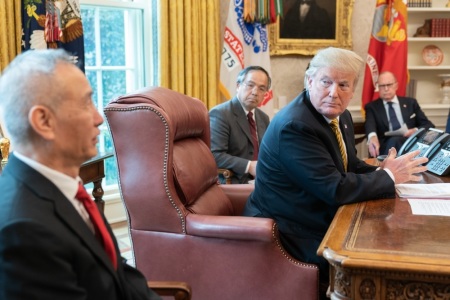Trump urged to condemn China's religious freedom abuses in trade talks

The Trump administration was strongly urged by a congressionally-mandated commission to bring up the continued persecution of Christians and other religious minorities with China’s top trade negotiator during this week’s trade talks in Washington.
The bipartisan U.S. Commission on International Religious Freedom, which includes three evangelical leaders who’ve engaged informally with the Trump White House, called for administration officials to discuss China's systemic persecution of Christians, Uighur Muslims and others minorities with Vice Premier Liu He during his visit.
Liu's visit comes as the U.S. Department of Defense estimates that as many as 3 million Uighur Muslims have been sent to detention camps in the Xinjiang province of China, while countless Christians, Buddhists, Falun Gong practitioners and other religious adherents continue to face arrest, imprisonment and the closing of their houses of worship.
“The communist Chinese government’s brutal campaign to ‘sinicize’ all religions is one of the worst abuses of religious freedom taking place today,” USCIRF Commissioner Gary Bauer, a veteran social conservative activist, said in a statement.
“During these talks about our trade relationship with China, religious persecution and human rights more broadly must be on the table.”
The Trump administration believed that it was nearing a trade deal with China that would have opened up the Chinese market to U.S. companies. But after days of negotiation between Liu, Treasury Secretary Steven Mnuchin and U.S. Trade Representative Robert Lighthizer, no deal was reached.
Additionally, the U.S. increased tariffs on up to $200 billion of Chinese goods by 15 percent as China was accused of backtracking on months of negotiations when it submitted drastic edits to a draft trade agreement. Chinese officials blamed the U.S. for the deal not being reached and vowed to counter the U.S. tariffs.
USCIRF and other religious freedom advocates have long called for the U.S. government to include religious freedom concerns as part of the U.S.’ ongoing trade discussions with China and other countries called out for religious freedom violations.
At an event on Capitol Hill last week, Bauer said that trade negotiations with China should be more than just about “tariffs and jobs” but should also ensuring that the Chinese people are allowed to worship the way that they see fit.
“This is about the right of every man and woman, whether Muslim or Buddhist or Christian or Falun Gong, to worship as he or she sees fit,” Bauer argued in a statement Friday. “At a time when the lives and freedoms of millions of Chinese people are under attack by their own government, we must put religious freedom and human rights on the agenda, too.”
China has been labeled as a country of particular concern by the U.S. State Department for the past 20 years, a designation given to countries with some of the most severe violations of religious freedom.
In its 2019 annual report, USCIRF called for the Trump administration to use targeted sanctions against Chinese officials who either “perpetrated or tolerated” religious freedom violations.
USCIRF suggested the administration sanction the Communist Party Secretary of Xinjiang, Chen Quanguo. Quanguo is said to have been responsible for violations committed against Buddhists in Tibet, who are reportedly subject to intrusive surveillance and political indoctrination.
USCIRF, a commission established by the International Religious Freedom Act to make recommendations to the executive branch and Congress, called for the U.S. to preserve the “cultural and linguistic” heritage of the religious groups in China as well as coordinate a response to China’s religious freedom violations with world allies.
“If we were going to rank the Tier 1 countries [of concern], China would be in a category all by itself [with] the level of persecution,” Bauer said at the rollout of the USCIRF annual report. “They are an equal opportunity persecutor.”
In March, U.S. Ambassador-at-Large for International Religious Freedom Sam Brownback spoke in Hong Kong and contended that the Chinese government “is at war with faith.”
“The Chinese Communist Party must hear the cry of its people for religious freedom,” Brownback said.
Friday afternoon, Vice President Mike Pence met with USCIRF and responded in a tweet that the Trump administration would defend religious freedom.
"Great mtg with the U.S. Commission on International Religious Freedom today w/ @AmbJohnBolton. Thank you to the Commission for its efforts to highlight the plight of the Rohingya & the Uighur Muslims. @POTUS & our Admin will ALWAYS stand up for religious freedom," he wrote.
Follow Samuel Smith on Twitter: @IamSamSmith
or Facebook: SamuelSmithCP





















